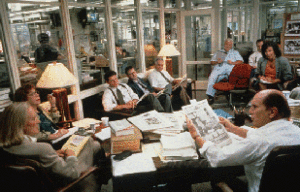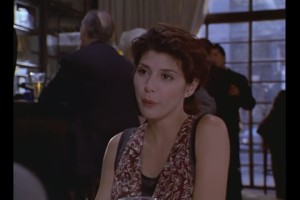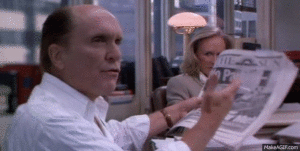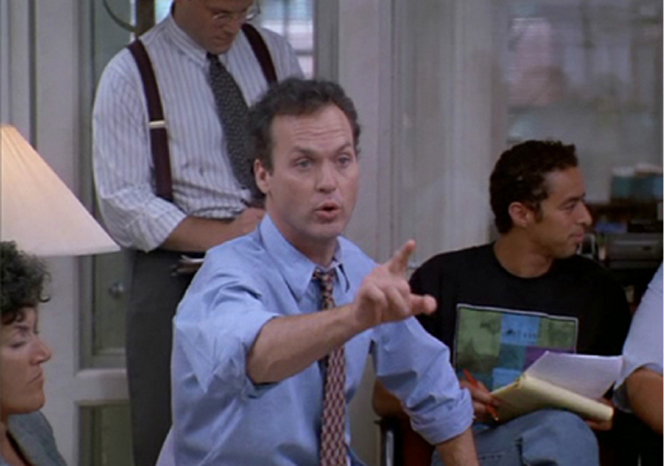I spent two years working for an independent newspaper that published on a weekly basis. Every Wednesday we went to print, and with just three employees the stress to make the deadline was a real, often-painful thing. Magnify that by 300 employees, make the paper a daily, and the office a struggling medium-sized paper in Manhattan, and you set the stage for Ron Howard’s 1994 drama “The Paper.” While other newspaper movies sell the profession’s sexy side with such controversies as murder (“The Pelican Brief”), or breaking exclusives (“All the President’s Men”), “The Paper” is a different film, a movie that could have almost been a documentary on the stresses of a news office were it not for its compelling script and the phenomenal acting that lines its run-time.
At the film’s opening, we are introduced to Henry Hackett (Michael Keaton), a City Editor at The Daily Sun who wakes up at 7 a.m. next to his pregnant wife, passed out in a shirt and tie from working late the night before. “Who comes home from work at 4 a.m.?” his wife demands. The conflict glossed over, it isn’t long before the two are in the kitchen, talking about the latest news: a parking crisis here, a train wreck there, before discussing the biggest item from the last 24 hours, a shooting in Brooklyn that every paper in town covered except The Sun. Keaton’s acting says it all; that in between swilling Cokes to stay awake he will make up for the screw-up at all costs.
Hackett is an intriguing choice for the film’s main protagonist; a man sandwiched between work and family who makes the lesser, if somewhat understandable choice of putting more effort into work than his relationship. Seconds after arriving at the office he is bombarded with grievances from his co-workers, from petty trifles to full-blown crises, having to manage these issues before he’s even had time to sit down. “Doesn’t anyone say good morning anymore?” he muses. Half his day is planned and budgeted before he’s even had a chance to catch his breath.

“The Paper’s” two greatest assets are its tight, congealed story and its acting, the film covering both the excitement of the newsroom as well as its humdrum. Scenes of the craziness of the news office are comical, such as freelancer James McDougal (played by the ever-pleasing Randy Quaid) firing a handgun into a stack of papers to call for silence. Others, however, involve painstaking discussions of what story should run on what page and will probably only strike a chord with people who actually do this for a living.
The staff that makes up the newspaper office are all played expertly by their respective actors. Robert Duvall, star of such blockbusters as “Apocalypse Now” and even the more modern “Gone in 60 Seconds” has never been better as Bernie White, the paper’s Editor-in-Chief. He runs the ship when he must (seen best during the film’s two staff meetings and a heart to heart with Henry and another with Managing Editor Alicia Clark), but is content to fade into the background when needed. The film wisely knows that day-in/day-out grunt work by many makes a paper run, and not flashy management by the few.
 Although poised as the film’s least likable character, as Alicia, Glenn Close brings heart to the role, giving us a by the numbers, hard-nosed boss who forgot long ago what it’s like to run features instead of budgets. Close is talented and takes what could have been a thankless role and garners instead realness and sympathy. Alongside her, Randy Quaid turns in a performance as McDougal that quickly wins us over. Additional players such Roma Maffia, Marissa Tomei (as Hackett’s wife), Clint Howard, and Geoffrey Owens flesh out supporting roles with skill, making The Daily Sun feel like a real place rather than a fictional setting for a film.
Although poised as the film’s least likable character, as Alicia, Glenn Close brings heart to the role, giving us a by the numbers, hard-nosed boss who forgot long ago what it’s like to run features instead of budgets. Close is talented and takes what could have been a thankless role and garners instead realness and sympathy. Alongside her, Randy Quaid turns in a performance as McDougal that quickly wins us over. Additional players such Roma Maffia, Marissa Tomei (as Hackett’s wife), Clint Howard, and Geoffrey Owens flesh out supporting roles with skill, making The Daily Sun feel like a real place rather than a fictional setting for a film.
Acting aside, “The Paper” is astute in its portrayal of the toll long hours and pressing deadlines have on relationships of all kinds, from fathers and daughters to husbands and wives. Scenes of family strife at the hands of hardworking Hackett are poignant in their observations, but others, such as Bernie and his daughter (Jill Hennessy) reconciling a lifetime of disappointment and regret in their own, albeit non-traditional way, will doubtless be relatable to anyone who’s ever made the wrong choice and needed a second chance. The film takes intelligent and conscious steps to paint its characters as every-men; even if we don’t agree with their decisions, we can understand them, which might be a wholly more important achievement for a film to make.

“The Paper” is a film that tries harder, not because its ultimate conclusion, but because of the wisdom it contains. The thing about working for a newspaper, as with working for a hospital or the police, is that you’re never truly off duty. You never know when a situation will arise that will demand your particular skill set at a moment’s notice. Few movies on the subject understand this better than “The Paper.” The film’s about love…of a husband, of a wife, of a daughter…and of a job. And while most people may not want to put themselves through this kind of stress for either, watching “The Paper,” you may just gain a small appreciation for the blood, sweat, and tears that you never knew went into your morning news.
– by Mark Ziobro


